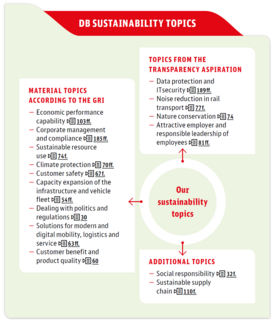Sustainability
Sustainability management
The importance of sustainability and, in particular, the importance of climate protection are reflected in our sustainability organization as well as being anchored in the Strong Rail strategy.
The Chief Sustainability Officer (CSO) is responsible for the issues of sustainability and the environment – and therefore also for climate-related opportunities and risks. The role is performed by the Chairman of the Management Board (CEO) of DB AG. The CSO’s perspective is therefore incorporated in a very central role in all important Group decisions. In his dual role, the CEO was also significantly involved in the development of the Strong Rail strategy with regard to climate-relevant decisions. A central component is the Green Transformation of DB Group, which is gradually making all products, services and operating processes more environmentally friendly. The Management Board and Supervisory Board set the climate-related targets for DB Group and its subsidiaries.
The central Sustainability and Environment organizational unit and its five specialist departments are responsible for overall coordination of Group-wide sustainability issues. The management of Sustainability and Environment is the highest position responsible for sustainability and climate-related issues under the Management Board and reports directly to the CEO.
The structure of the variable compensation of Management Board members and executives as well as other employee groups in DB Group is largely geared towards sustainability goals and in particular a significant reduction of CO₂e in the transport sector in Germany in accordance with the Federal government’s transport policy objectives.
Sustainability reporting
The 2022 Integrated Report refers to the reporting/calendar year 2022. For the purpose of comparison, most of the key figures are also presented for financial years 2021 and 2020.The Integrated Report is published on an annual basis. The 2022 Integrated Report will be published on March 30, 2023 (2021 Integrated Report: March 31, 2022). The Integrated Report addresses the key stakeholder groups of DB Group. The reporting covers all material economic, social and environmental aspects. All fully consolidated DB Group companies are included in the reporting. Deviations from this reporting scope are noted as such.
The data collection methods and bases of calculation used for the data in the Integrated Report are based on the relevant standards:
- GRI standards: The Integrated Report was prepared in accordance with the Global Reporting Initiative (GRI) standards. In the GRI Index, we refer to the contents of general and specific disclosures.
- CSR-RUG: We also implement the requirements of the CSR Directive Implementation Act (CSR-RUG) on a voluntary basis. Information on the key areas of action can be found in the non-financial statement.
- UN Global Compact: In addition, the Integrated Report provides information on the implementation of the ten principles of the UN Global Compact (UNGC).
- TCFD: Moreover, DB Group follows the recommendations of the Task Force on Climate-related Financial Disclosures (TCFD) on the reporting of climate-related information. The TCFD index lists references to the relevant passages in the report.
- Audit: Material sustainability-related content, indicators and text passages that do not fall within the scope of the statutory audit of the management report with reasonable assurance are marked by the section heading “Further disclosures” and a gray background, and are audited with limited assurance by a third party appointed separately by the Management Board, PricewaterhouseCoopers GmbH Wirtschaftsprüfungsgesellschaft (PwC).
Selection of sustainability topics
Our Strong Rail strategy also forms the overarching framework for our reporting. We are also reliant on the support and acceptance of our stakeholders in order to successfully implement our strategy. In 2019, as part of a comprehensive materiality analysis (2019 Integrated Report), we therefore asked them for an assessment of 16 important areas of action for sustainability in DB Group. These areas of action reflect the focus points of our strategy and supplement them with other topics that our stakeholders deem relevant. Based on the revised GRI standards, a more comprehensive approach was adopted in 2022 than in the previous year in order to validate and update the set of material topics. As part of a step-by-step procedure, two complementary surveys were conducted.
Our sustainability topics are made up of:
- Material topics according to the GRI: Compared to the previous year, supplemented by the additional topics of corporate governance and compliance, customer safety and the handling of politics and regulation.
- Topics from the transparency aspiration: Arise from our comprehensive transparency aspiration towards our stakeholders.
- Additional topics: Supplemented on the basis of an internal assessment of their significance.
Non-financial Statement
DB Group has opted for the voluntary submission of a non-financial statement (NFS). As part of our integrated report approach, we provide comprehensive reports on all material sustainability issues.
The update of the materiality analysis in 2022 resulted in a change in the key areas of action within the scope of the CSR Directive Implementation Act (CSR-RUG). The issues of climate protection and economic performance have lost their material status within the scope of CSR-RUG as their impacts are regarded as less significant, but are still reported to be material in accordance with the GRI standards. The area of action customer benefit and product quality was newly classified as material. The contents of the NFS can be found in the relevant chapters of the Group Management Report and were prepared using the GRI standards and taking into account the UNGC reporting requirements. In addition, we provide additional voluntary disclosures on further matters.
